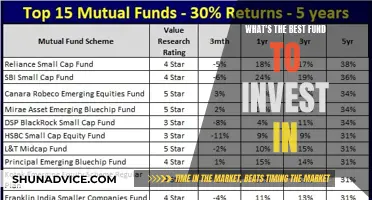
Index funds are a low-cost, passive investment strategy that mirrors the performance of a particular stock market index, such as the S&P 500. They are a great option for investors looking to build wealth over the long term, especially those saving for retirement. Index funds are less expensive than actively managed funds and typically carry less risk than individual stocks. This is because they don't aim to beat the market but rather be the market by purchasing stocks from every firm listed on a market index.
NerdWallet offers a comprehensive guide to investing in index funds, including how to get started, the costs involved, and the best index funds currently on the market.
What You'll Learn
- Index funds are a low-cost, easy way to build wealth
- Index funds perform better than actively managed funds over the long term
- Index funds are less expensive than actively managed funds
- Index funds carry less risk than individual stocks
- Index funds are a great investment for building wealth over the long term

Index funds are a low-cost, easy way to build wealth
One of the main advantages of index funds is their low cost. They have lower fees compared to actively managed funds because they require less management. Actively managed funds employ fund managers who actively select and trade investments, aiming to "beat the market". However, these funds often underperform the market and come with higher fees, which can eat into your investment returns. On the other hand, index funds simply aim to mirror the market's performance, resulting in lower costs for investors.
Another benefit of index funds is that they provide a diversified investment. Individual stocks may rise and fall, but indexes tend to rise over time. By investing in an index fund, you are spreading your investment across a broad range of companies, reducing the risk associated with investing in individual stocks. This diversification can help smooth out the volatility often seen in the stock market, providing more stable returns over time.
Additionally, index funds are relatively easy to invest in. You can purchase them directly from a mutual fund company or a brokerage, and they typically have low investment minimums, making them accessible to a wide range of investors. When choosing an index fund, it's important to consider factors such as company size, geography, business sector, and market opportunities. You can also diversify your portfolio by investing in a combination of index funds that focus on different sectors or asset classes.
Overall, index funds offer a simple and cost-effective way to build wealth over the long term. By providing diversified exposure to the stock market and mirroring the performance of well-known indices, index funds have become a popular choice for investors, particularly those saving for retirement.
Unlocking Pension Funds: Impact Investing with Fitzpatrick and Omidyar
You may want to see also

Index funds perform better than actively managed funds over the long term
Index funds are a passive investment strategy that aims to mirror the performance of a specific market index, such as the S&P 500 or the Dow Jones Industrial Average. They are a low-cost, easy way to build wealth over the long term and are, therefore, popular with retirement investors.
Index funds don't try to beat the market or earn higher returns compared to market averages. Instead, they aim to be the market by buying stocks of every firm listed on a market index to match the performance of the index as a whole. This passive strategy means they don't need to actively decide which investments to buy or sell.
Actively managed funds, on the other hand, try to beat market returns with investments hand-picked by professional money managers. These funds attempt to outperform the market by picking the hottest stocks and bonds. However, they often underperform the market and come with higher fees.
A study by S&P Dow Jones Indices found that not a single actively managed mutual fund managed to beat its benchmark in either the U.S. stock or bond markets regularly and convincingly over a five-year period. This is consistent with the findings of other studies, which have shown that index funds have generally outperformed actively managed funds over the long term.
According to SPIVA, only 29% of actively managed funds beat the S&P 500 in 2019, and only 9% continued to beat their benchmark in 2021. Actively managed funds often underperform due to the high expenses incurred in the search for hot stocks and bonds, which undermine their results. The average actively managed stock fund incurs annual expenses of about 1.3%, which means it must beat the market's performance by 1.3 percentage points just to break even.
Index funds, on the other hand, have much lower expenses because they don't employ large numbers of analysts and stock pickers. Their expenses are typically below 0.2% per year, and many charge even less than that. As a result, index funds typically bring investors better returns over the long term.
Capital Protection Funds: Secure Your Investments
You may want to see also

Index funds are less expensive than actively managed funds
Index funds are a passive investment strategy, meaning they aim to mirror the performance of a specific market index. This is in contrast to actively managed funds, which try to beat the market by investing in hand-picked stocks and bonds. Actively managed funds are therefore more expensive to run, as they require a team of professional money managers to research and select investments.
Index funds, on the other hand, simply buy all (or a representative sample) of the stocks or bonds in the index they're tracking. This means they have much lower operating costs, which are passed on to investors in the form of lower fees. Actively managed funds, meanwhile, need to cover the salaries of their staff, as well as the cost of frequent trading.
Index funds typically have lower expense ratios because they are passively managed. According to Investopedia, the average fee for an index fund is 0.05%, compared to 0.44% for an actively managed fund. Some index funds even have fees as low as 0.04%. Over time, these small differences in fees can add up to significant savings for investors.
In addition to lower fees, index funds also offer investors broad market exposure and diversification across various sectors and asset classes. This makes them a less risky investment option than individual stocks.
Smaller Companies, Bigger Returns: Investing in Franklin India's Future
You may want to see also

Index funds carry less risk than individual stocks
Index funds are a passive investment strategy that aims to mirror the performance of a stock market index, such as the S&P 500. They are a low-cost, easy way to build wealth over the long term, making them a popular choice for retirement investors.
Index funds typically carry less risk than individual stocks due to their diversified nature. An index fund is made up of the same investments as the index it tracks, which can include hundreds of stocks across various sectors and industries. This diversification means that a decline in the value of a single stock will have a smaller effect on the overall value of the fund, reducing the risk for investors.
In contrast, investing in only a handful of individual stocks is risky because the performance of the portfolio is heavily influenced by the price movements of those specific stocks. If one of those stocks declines in price, the investor's portfolio will be significantly impacted.
Additionally, index funds don't try to beat the market or earn higher returns than market averages. Instead, they aim to match the performance of the market by buying stocks of every firm listed on a particular index. This passive management strategy means that index funds don't need to actively decide which investments to buy or sell, reducing the need for hands-on management.
While index funds offer the benefit of reduced risk, it's important to note that they may not be suitable for all investors. Index funds lack downside protection, reactive ability, and control over individual holdings. They also offer limited exposure to different investment strategies and may dampen personal satisfaction for those who enjoy the excitement of making individual stock picks.
Invest Like Harvard: Accessing the Endowment Fund
You may want to see also

Index funds are a great investment for building wealth over the long term
Index funds are a group of stocks that mirror the performance of an existing stock market index, such as the S&P 500. An index fund will be made up of the same investments that make up the index it tracks, so the performance of the fund closely mirrors that of the index, without the need for hands-on management.
Index funds are considered a passive management strategy because they don't need to actively decide which investments to buy or sell. They are also often used to help balance the risk in an investor's portfolio, as market swings tend to be less volatile across an index compared with individual stocks.
Index funds are less expensive than actively managed funds, which try to beat the market by earning higher returns. However, fund managers rarely succeed in beating the market, and even if they do, it is unlikely that they will continue to do so over the long term. Actively managed funds often underperform the market, while index funds match it, typically bringing better returns over the long term for investors.
Index funds are also more tax-efficient than actively managed funds, and they are available across a variety of asset classes. Investors can buy funds that focus on companies with small, medium, or large capital values, or on specific sectors like technology or energy.
Overall, index funds are a great investment option for those looking to build wealth over the long term. They are a low-cost, passive investment strategy that mirrors the performance of the market, providing investors with returns that typically beat actively managed accounts.
Roth Funds: Where to Invest and Why
You may want to see also
Frequently asked questions
An index fund is a group of stocks that aims to mirror the performance of an existing stock market index, such as the Standard & Poor's 500 index. An index fund will be made up of the same investments that make up the index it tracks.
Index funds don't try to beat the market, or earn higher returns compared to market averages. Instead, these funds try to be the market by buying stocks of every firm listed on a market index to match the performance of the index as a whole.
Despite the fact that fund managers do a lot of work to "beat the market", they very rarely do. Actively managed funds often underperform the market, while index funds match it. As a result, passively managed index funds typically bring their investors better returns over the long term. Plus, they cost less, as fees for actively managed investments tend to be higher.
First, have a goal for your index funds. Then, research index funds and pick your index funds based on cost. Decide where to buy your index funds, such as from a mutual fund company or a brokerage. Finally, keep an eye on your index funds to make sure they're doing their job and aren't too expensive.







